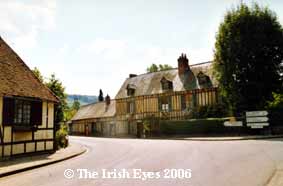
|
Dead quiet village. ©RJ Doyle. Reproduced with permission by www.irisheyes.fr |
The global village
Globalisation and economic progress are splendid things in so many ways, but how much more splendid they would be if they did not appear to steamroll everything in their path. A touch of "localisation" would make a huge difference.
Take the slow and seemingly unstoppable asphyxiation of local community life, starting with the corner shop, the café, the butcher, the bistro, the village, and then, one day, the vibrant town centre. The businesses that are the heartbeat of a place are being culled and France's social infrastructure is being transfigured. No wonder people seem worried.
Consider this village I know. Thirty years ago there were three cafés on our street. Today, there is none. The post office, the butcher: all have closed down. Forget depopulation: this village has 1,500 folk and growing. Forget isolation: the village is just 15 km from a large town. All that is left is a fairly dreary baker and a pharmacy. These are to French villages what a pub and a church are to Irish ones.
What do the people do? Where do they eat, or shop? The first myth to dispel is that they spend endless jovial hours in each other's warm dining rooms. In fact, many of them do not eat at home at all; they drive several miles to a Big Drive Thru near town for their fix of fat and carbohydrate. For many, it will be the second or third journey that day, adding to their car trips to the faceless, congested out-of-town shopping precincts where whole lives are inconvenienced in queues just to purchase basic items.
People blame the closure of local shops on these beastly hypermarkets. Many argue they would much prefer to shop closer to home, meet neighbours for a drink or a soup, and discuss yet another French defeat to the All Blacks. Perhaps people would walk more, which wouldn't be bad from the point of view of health, saving on petrol and tackling global warming. And then there's the jobs local business creates. Surely our leaders would find such arguments all very compelling.
Not a bit of it. Recently the village mayor decided to plan a superette for locals by now bored with repetitive, time-wasting car journeys to buy toilet rolls and milk. The mayor had to go cap in hand to seek approval from a diminutive bureaucrat somewhere in Paris's 21st arrondissement. The reply was Non. The reason? "Unfriendly competition" against a rather sorry little shop a few miles away. That place now has no incentive to improve its act. The result? More customers for the hypermarket.
Ireland has a slightly different problem. Roaming around the midlands recently we saw shiny new Tesco supermarkets looming large, like cathedrals, on the edge of many towns, with worshoppers paying homage from far flung places. Many villages still have small shops, but you still have to drive to them. This is because Ireland is now visibly suffering from what Americans term "sprawl", affecting not just the cities, but places like Roosky and Ballymahon. Where? Precisely.
Field after field is built on, with scores of speculative suburban style houses of often iffy quality. There is no sign of any services, schools or shops. The breeze-block shells that bleakly line remote country roads will soon emit traffic as young families rush for miles to do routine chores. Okay, Irish villages have always been more spread out than in France, but sprawl is different. Shorter trips with more local businesses and community would surely be far healthier and safer for people and the environment in Ireland too.
Listening to the car radio I was heartened to hear the Irish debating this question. France too is thinking about making it less costly to start a small business. More needs to be done to stop the rot though. Some friendly sales assistants behind the meat counter at Auchan hypermarket would probably love to set up shop on their own in a more convivial, local environment. Why don't political leaders incite these so-called steamroller hypermarkets to breathe life back into the villages they have choked by helping people to open up butchers and other small stores? Other small businesses and a few global ones would eventually follow suit. We could start with a Starbucks on the green that also sold milk and newspapers? Business would pick up and communities would thrive again. Call it "glocalisation".
©RJ Doyle
blog comments powered by Disqus